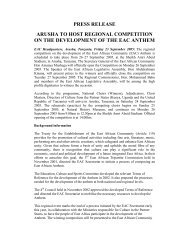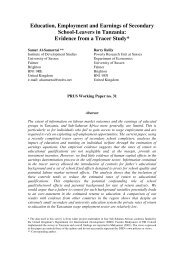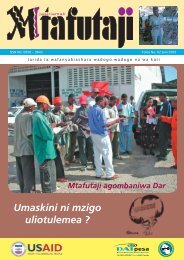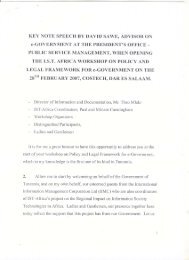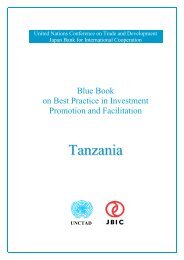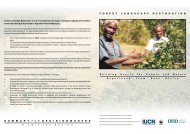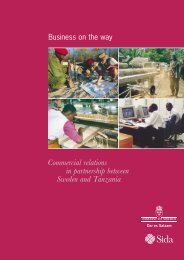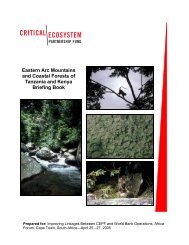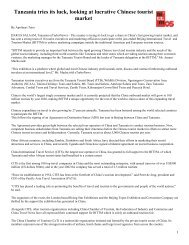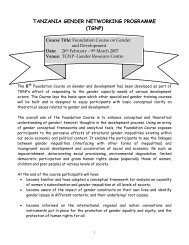Story: 1111AFR(Africa) - Tanzania Development Gateway
Story: 1111AFR(Africa) - Tanzania Development Gateway
Story: 1111AFR(Africa) - Tanzania Development Gateway
- No tags were found...
You also want an ePaper? Increase the reach of your titles
YUMPU automatically turns print PDFs into web optimized ePapers that Google loves.
Special Advertising SectionSouthern <strong>Africa</strong>n <strong>Development</strong> CommunityS A D C<strong>Tanzania</strong> – East <strong>Africa</strong>’sMost Undersold DestinationZambia – ReformingGovernment in the Pulse of <strong>Africa</strong>Mozambique – Awakening Ambitionsfor InvestmentMalawi – Vibrant in the Land of the LakeMauritius – Welcome to the Island in the SunReport produced by www.globalbusiness.uk.com
northern part of the country and saysthe Swahili culture can be found alongthe coast.To attract inward investment and toachieve growth, the minister isbuilding capacity by working withmajor carriers, such as KLM, BritishAirways, South <strong>Africa</strong>n Airways andSwissair. “KLM was coming in once aweek,” says the minister, “but nowthey are coming in once a day.”Indeed, the local management of theDutch carrier describes <strong>Tanzania</strong> as“the most undersold destination inEast <strong>Africa</strong>.” One major benefit couldbe that the state-owned Air <strong>Tanzania</strong>is now slated for privatization, whichwill release new investment forimproved domestic airline services.“We will opt for lowvolume but high yieldtourism.”says Zaki Meghji,Minister of TourismMost of <strong>Tanzania</strong>’s 12 national parks,occupying some 4.5% of the landarea, already have management planswith a major emphasis on sustainabledevelopment and protection ofhabitats. The custodian of thesejewels in <strong>Tanzania</strong>’s tourism industry is<strong>Tanzania</strong> National Parks (TANAPA),whose mandate will be extended tothe two new national parks at Irindaand Saadani – the former is in thesomewhat neglected south of<strong>Tanzania</strong>, while the latter is the onlyplace in <strong>Africa</strong> where animals comedown to the beach. “Our primaryfunction is to ensure a sustainableenvironment where nothing affectsbiological and ecological factors,”says TANAPA’s director general LotaMelamari. Based on a UNESCOSpecial Advertising Sectionmodel, TANAPA is working on aproject to get the local communityengaged in tapping into the economicbenefits of national parks.Conference tourism in Dar esSalaam and at Arusha, crowned the‘Geneva of <strong>Africa</strong>’ by former USpresident Bill Clinton during theBurundi peace negotiation signingceremony two years ago, isparticularly interesting. The fullymodernized Arusha InternationalConference Center (AICC), a globalconference center in the heart of<strong>Africa</strong>, is perhaps SADC’s premierlocation for conferences, meetings,seminars and workshops. AICC in2001 became the first conferencecenter in East <strong>Africa</strong> to receive acertificate of recognition from theInternational Congress andConventions Association.A showpiece for <strong>Tanzania</strong>’s tourismindustry is the 86-room Hotel SeaCliff, Dar es Salaam’s internationallyacclaimed five-star hotel, specializingin the needs of the business traveler.“This is a small hotel so we have achance to be personal,” says generalmanager Kevin Stander. “We get toknow a lot of our guests, somethingyou can’t do in a 500-room hotel.”Stander does not consider Dar esSalaam to be a major touristdestination but believes that the northof the country with its resorts hashuge future potential. Expansionplans at the Hotel Sea Cliff include amini ‘stone town development’ withboutiques, restaurants and a medicalcenter to be called ‘The Village Walk.’A newly arrived competitor, alsolocated on the scenic MsasaniPeninsula outside Dar es Salaam, isthe Golden Tulip, managed by HerbertFriese for Indian Ocean Hotels, andoffering a range of business,conference and leisure facilities. Thearchitecture is inspired by Arabinfluences and all rooms have oceanviews.A government initiative that willboost Dar es Salaam is a project todevelop day tours for businesstravelers, such as visits to thehistorical coast of Bagamoyo. “Wecould reach business executives whodon’t have time to go to theSerengeti,” says the Tourism Minister,“If you just have one day, we proposeyou do something instead of flyingstraight back to Europe or the US.”S3Dar es Salaam, <strong>Tanzania</strong>, Tel: 255-22-2 600 380Fax: 255-22-2 600 476, 255-22-2 600 419Website: www.hotelseacliff.comEmail: reservations@hotelseacliff.cominformation@hotelseacliff.com
ZAMBIATHE REAL AFRICAZambia is often described as the “real <strong>Africa</strong>” because ofthe awe-inspiring Victoria Falls on the Zambezi River,known locally as “the smoke that thunders”, as well as forits huge protected wilderness areas.The South Luwangwa National Park is home to arguablythe most diverse range of game in <strong>Africa</strong>. After thesenatural wonders comes the spectacular scenery in placeslike the Bangweulu Floodplains, the Luangwa River valleyand the manmade expanse of Lake Kariba.Special Advertising SectionLivingstone, the adventure capital of <strong>Africa</strong> with its ownairport, offers a wide range of activities for wildlife andadventure enthusiasts, as well as access to the best viewsof Victoria Falls. “We want to develop Livingstone as atourism capital,” says HE Levison Mumba, Zambia’sMinister of Tourism, Natural Resources & Environment.“We consider tourism in Zambia as our major invisibleforeign exchange area. Current liberalization andprivatization of the economy is leading to continued foreigninvestment in the Zambian tourist industry. The increase invisitor numbers can be attributed to the unspoiledwilderness, peace, the friendliness of our people and ourtradition of political stability over the past 30 years.”Zambia’s President HE Levy Mwanawasa, who says moremust be done to publicize Zambia’s tourist attractions,shares his vision. “If people come to visit us as tourists, itwill also initiate a way for investors to consider Zambia asan investment destination,” he says. The presidentAmazing wildlifeconsiders that it is essential to protect wildlife. “It will nothelp our country to allow poachers to kill the abundantwildlife that we have,” he adds.Not only has Zambia passed legislation to protect wildlife,the government has sought funding from the EuropeanUnion for all the 19 national parks (of which only four haveso far been used by tourists) to employ village scouts toprotect wildlife from poachers. “In the past, poaching wasassociated with meat for the poor but now it is on acommercial scale,” says Mumba. “The wildlife officerswere not sufficiently equipped to match the arsenal whichthe poachers sometimes employ.”Zambia is expecting a 30% increase in hotel bed capacitywith new openings in Cizamba and Chingola on theS4
Copper Belt. Daily direct flights link the capital Lusaka withJohannesburg but what the government wants most isdirect flights from Europe to Zambia.The leading hotel for business and leisure travelers inLusaka is the 155-room Holiday Inn, four km from thedowntown and 27 km from the airport, with shopping andentertainment areas close by. The air-conditioned propertyhas a large outdoor swimming pool and sauna, wellequippedfitness center with treadmills and exercise bikes,an Internet café offering email and Web access and arange of dining and beverage options.MOZAMBIQUE“SLEEPING BEAUTY” OF SOUTHERN AFRICAThe Ministry of Industry Trade and Tourism in Maputodescribes Mozambique, a country twice the size ofCalifornia in Southern <strong>Africa</strong> with 2,400 km of pristinecoastline, as Southern <strong>Africa</strong>’s “sleeping beauty.” Afavorable climate for investment has been created sincethe end of the civil war in 1992, which was followed by adecade of economic reforms and growth.Civil servants hope that before long the peak figure of300,000 tourists, achieved in 1973 – two years beforeindependence from Portugal – will be surpassed. Incolonial times, the vast majority of visitors were sunseekers from South <strong>Africa</strong> and pre-independenceZimbabwe, attracted by the bars and Mediterranean stylerestaurants of Maputo and Beira serving seafood. Theystill represent a substantial market for Mozambique.Special Advertising SectionWith most of the interior difficult to access, tourists areattracted to the beaches of the capital Maputo and thenearby resorts of the Ponta do Ouro Zone, including PontaMalongane, Ponta Mamoli and the Maputo Game Reserveup to Cape Santa Maria. This zone will play a major role incatering for tourists of middle and higher income fromneighboring states, especially South <strong>Africa</strong>. Its proximity toMaputo will also attract the domestic market based there.Other potential lies in the Vilanculo zone – BartolomeuDias, including the Bazaruto Archipelago and the BazarutoNational Park.Mozambique’s best hope for more visitors is toencourage tourists who would include a trip toMozambique during their visit to neighboring countries,such as South <strong>Africa</strong> or Zimbabwe, with the added bonusthat Mozambique can offer photo safaris and game parksas well as sun and beach vacations.A leading hotel in Maputo for the business and corporatetraveler is the historic Hotel Cardoso, which wascompletely renovated in 1995 by its new owners lead byLonrho <strong>Africa</strong>. The hotel is built in generous gardens andenjoys breathtaking views over Maputo bay and the city.The large lobby and public areas benefit from plenty ofnatural daylight and offer spaces for meetings orrelaxation.The Holiday Inn Maputo, just five km from the centralbusiness district, is situated on the beachfront and offersa high standard of service for the visitor. For leisureactivities the hotel has a fitness center and outdoorswimming pool set in landscaped gardens with aterraced patio.Mauritius – Island Paradise for TouristsMauritius, an Indian Ocean island paradise some 500 miles eastof Madagascar, is predominantly a holiday destination for beachresort visitors. The industry earns the island economy some$510 million a year and entertains more than 650,000 tourists,about 70% of whom are from Europe.The Maritim Hotel, located on a 25-hectare private estate alongTurtle Bay on the island’s northwest and sunniest coast, is aworld class luxury resort hotel, offering its guests a wide range ofsports and leisure activities. From this base, 15 minutes by roadfrom the capital Port-Louis, tourists can enjoy the sub-tropicalclimate with clear warm sea waters, and meet the friendly andwelcoming ethnic population.The Maritim offers conference facilities for business guests aswell as gourmet dining and sea facing rooms to suit all tastes.With its own golf course and boat house for water sports, theMaritim caters for every possible pastime, including para sailing,big game fishing, mountain hiking and underwater safaris.Families are especially welcome at the Martim, together withcouples seeking an exotic venue for a wedding.S5
Special Advertising SectionF I N A N C ETANZANIATHE BIG LEAP FORWARD<strong>Tanzania</strong> is becoming a top investment destination inSouthern <strong>Africa</strong>.Low inflation, a stable currency and government deficitsunder control. President Nyere <strong>Tanzania</strong> rejectedcapitalism but since 1986 President HE Benjamin Mkapahas embraced market-driven reforms and liberalized thefinancial sector with privatization top of the nationalagenda.Estimates are that overall GDP growth will rise graduallyreaching 7% by 2005 from its level of 5.8% this year. Thegovernment is confident of cutting inflation to below 5%by December 2002 and then holding it steady. “Given thisanticipated rate of inflation in the short term, the value ofthe shilling is expected to remain stable,” says FinanceMinister HE Basil Mramba. <strong>Tanzania</strong> is operating amanaged float of its exchange rate with the Bank of<strong>Tanzania</strong> (central bank) only intervening if the exchangerate changes by more than 5% a day.In the future the economy is expected to be exportoriented with opportunities for foreign investment in gold,S6coal and iron ore, infrastructure, hydrocarbons,telecommunications, utilities, fisheries and tourism.<strong>Tanzania</strong>’s agricultural land is one of the most fertile in theworld with the highest concentration of wildlife. <strong>Tanzania</strong>offers a peaceful and stable political environment to live inand work.The island of Zanzibar has particular potential for tourismand is perhaps the best kept secret in the Indian Oceanwith its fascinating historical Stone Town and magnificentbeaches. Arab traders first discovered it in the eighthcentury and its oldest building is a mosque dating to 1107.Production of cloves and other agricultural exportsproduce revenues of more than $30 million a year.With macro economic stability largely achieved, the futurechallenge is to “concentrate on the micro-economic level”in <strong>Tanzania</strong>, says Minister of Planning and Privatization HEDr Abdallah Kigoda. “We have to reach out so that thebenefits can extend to the common people,” he says. “Ourprogram – Vision 2005 – will now concentrate on issuessuch as education, health care, rural improvement, waterand HIV.”<strong>Tanzania</strong> is aware that in seeking investors it must inKigoda’s words “reduce bureaucracy and eradicatecorruption.” He believes that the international media must
“perceive that <strong>Africa</strong> has changed” andthat the reform agenda in <strong>Tanzania</strong> ismoving ahead.Special Advertising SectionAll banks in <strong>Tanzania</strong> can nowbecome private and the majority ofthe community of around 20 banks arenow foreign banks with major playersrepresented including Citibank,Standard Chartered, Barclays andSouth <strong>Africa</strong>’s Stanbank. “Theenvironment is very favorable forinvestment banking,” says HE DaudiBallali, governor of the Bank of<strong>Tanzania</strong>. “Foreign banks have comehere with a lot of capital and they havebeen able to enter the market veryquickly. We have facilitated and createda good regulatory environment.”“The environment is veryfavorable for investmentbanking,” says DaudiBallali, governor of theBank of <strong>Tanzania</strong>.The central bank’s success inregulating the financial sector isdemonstrated by the low number ofbank failures in <strong>Tanzania</strong> compared toits neighbors. Foreign-owned bankshave also begun to open branchesoutside the principal business center ofDar es Salaam.The governor is delighted thatfollowing its takeover by a South<strong>Africa</strong>n financial institution, <strong>Tanzania</strong>’sbiggest bank has expanded the bank’sbranch network from 35 to 40 offices.“What has happened really is todeepen financial services in <strong>Tanzania</strong>and to bring products that were notthere,” says Ballali. “The progress thatsome other countries have taken thepast 30 years to achieve, we have donein a very short time.”Under Ballali, <strong>Tanzania</strong> has increasedits foreign reserves to $1.2 million witha strong balance of payments andsharply reduced debt. “The saving weare getting from cutting debt from over$6 billion to $3 billion has beenchanneled into poverty reducingsectors such as education and health,”says Ballali. “The conditions of theaverage <strong>Tanzania</strong>n is certainly betternow than it was in the mid-1980s.” Thegovernor’s vision is of high employmentS7
Special Advertising SectionS8
in the cities leading to greater demand for agriculturalproducts.Special Advertising SectionLooking at the economy as a whole, the financial sectorhas benefited most from <strong>Tanzania</strong>’s reforming policies.“The central bank owns the process of transformation,”says Ballali.ZAMBIANEW DEAL PROMISES ECONOMICRECOVERYLeft : Mr Mwanawasa - President of Zambia,Centre : Govenor Daudi Ballali - Bank of <strong>Tanzania</strong>,Right : Govenor Caleb Fundanga - Bank of ZambiaZambia, a landlocked country of 10 million people inCentral <strong>Africa</strong>, surfaced from 75 years of Britishcommercial and colonial government in 1964, with aworkforce of fewer than 110 university graduates and aneconomy almost solely dependent on mining. Its relianceon mineral exports has proved a handicap over the past 40years and even after privatization the mining sector hasstruggled to perform, due to low world prices for copper,cobalt and zinc.Under HE President Levy Mwanawasa, who took officeafter elections in January, the first sustained drive to attractdiverse sources of foreign investment is under way. Thegovernment which has pledged to adjust Zambia’s ‘onesize fits all’ macroeconomic policy has launched its ‘NewDeal’ economic program. The theme of Minister of Finance& National Planning Emmanuel Kasonde’s 2002 budget is‘food security through production and job creation.’ Its keyfeatures include support for farmers, lower costs forgovernment medical care and backing for industries liketourism that have enormous potential for growth.“The international community willfind Zambia to be a very safe andprofitable destination.” says PresidentMwanawasa“This country is blessed with abundant land, good soil,plenty of rain and good sunshine,” says Mwanawasa,whose ruling Movement for Multiparty Democracy (MMD)was the first to embrace free market policies in the 1990s.“The conditions are perfect for agriculture and above allour people are hardworking. We are pursuing a policy ofliberalization which literally means that you can take anyamount of money out of this country. The internationalcommunity will find Zambia to be a very safe and profitabledestination.”Zambia’s location in the center of <strong>Africa</strong> with connectionsto north and south makes it an ideal place for distributingproducts and commodities to surrounding countries. Itsrecord of peace and stability is in stark contrast to some ofits neighbors. Inflation has been reined in to 18% from30% last year and the Ministry of Finance expects to haveinflation down to a single digit figure within two years.The Bank of Zambia (central bank), whose newlyappointed governor is economic Caleb Fundanga, senioradviser to the president of the <strong>Africa</strong>n <strong>Development</strong> Bank,says Zambia is the most liberal economy in the region withtax incentives for investors and no foreign exchangecontrols or restrictions on the repatriation of profits. Thecentral bank itself has lead the way in modernizing itsoperations – apart from Zambia, only South <strong>Africa</strong> haselectronic clearing systems for its banks although Mauritiusis about to introduce it.Through its spokesperson, the Bank of Zambia saysprivatization has been extremely successful over the pastdecade. In 1991, when the MMD took office after votersgrew dissatisfied with big government policies and chronicfood and fuel shortages, more than 85% of the economywas state controlled. The mines employed almost half theworkforce and the country was weighed down with debt.Since then, more than 250 corporations have beenprivatized including the mines. “We have privatized in allsectors,” the spokesperson says. “The Sun Hotel wasstate owned but through privatization we have attractedthat kind of investment into tourism. In the mining sector,the industry was almost collapsing but now it is reviving,because investment has gone in and production hasimproved.” On the list for upcoming privatization will be theIndeni Refinery, the <strong>Tanzania</strong> Pipeline and theconcessioning of Zambia Railways, as well as the stateownedpostal and telecommunications entities.President Mwanawasa is keen for Zambians to see thebenefits of privatization, especially in the mines, as hisgovernment is acutely aware that the sell-offs are the pricefor continued and expanding support from aid donors.“If our citizens are mere spectators then you find thatinvestments may not be relatively secure,” he says.“I am anxious that the new owners of the mines provideemployment to our people. We see our professionalsservicing our neighboring countries. If they are found tobe beneficial for other countries, why can they not bebeneficial to their own country?”The principal incentives for investors are found in theExport Processing Zone Act that has established tax freezones at Ndola in the Copper Belt, Kafue and Luanshya.The president says there are plans to extend the taxexemptions in the three centers to businesses thatestablish enterprises in rural areas and those that uselocally sourced raw materials. The Zambian constitutionhas been amended to outlaw nationalization of foreignownedbusinesses. “We want to produce quality goodsthat can compete on the international market,” saysMwanawasa, whose reforming policies are expected toresult in lower prices and stricter control of budgetspending.S9
Special Advertising SectionS10
When Japan offered to help <strong>Tanzania</strong>with highways, the governmentoffered them “the hell road” – thehighway leading to the NgorongoroNational Park. “It was our prioritynumber one,” recalls Minister ofTourism HE Zakia Meghji, “Every daypeople got stuck and could not reachthe park. Now, there will be tarmac upto the entrance.”<strong>Tanzania</strong> is highly dependent on aidfor road construction andrehabilitation using funds from theEuropean Union, the UK, Germanyand others including the Kuwait Fundfor Arab Economic <strong>Development</strong>. Thepermanent secretary at the Ministry ofWorks J.W.H. Kijazi explains that thegovernment has established the<strong>Tanzania</strong> National Roads Agency toprovide “cost effective andsustainable maintenance anddevelopment of the trunk and regionalroad network to support the socioeconomicdevelopment of <strong>Tanzania</strong>.”The creation of Tanroads is in linewith a SADC protocol, says its chiefexecutive Olav Ellevset and provides a“simpler and less bureaucraticadministration” for the 90,000 kmroad network. Every quarter, there arebetween 500 and 700 new contracts.The government has also opened thedoor for private sector investmentthrough Build, Operate and Transfer(BOT) projects.Privatization is envisaged for the<strong>Tanzania</strong> Railways Corporation, whose3,027 km network covers the wholecountry and the neighboringlandlocked countries of Burundi,Congo, Malawi and Rwanda.As an ex-Zambian Air Force officerHE Lupando Mwape, the Minister ofTransport and Communication, is wellqualified to direct ambitiousgovernment plans for better railroads,airports, highways andtelecommunications. “The keySpecial Advertising SectionTRANSPORT AND TELECOMTANZANIASURFACING THE HELL ROADZAMBIAOPENING UP TOCOMPETITIONobjective is to align my ministry’sservices to our economic policy ofliberalization,” he says.In telecommunications, this involvesopening up the sector to competitionwith the imminent arrival of a fourthoperator in Vodacom, a major playerin cell phones. The former monopolyholder Zambia TelecommunicationsCompany (ZAMTEL) actuallywelcomes this deregulation since ithas “strengthened its resolve toprovide quality services to itscustomers.”Zambia’s President HE LevyMwanawasa considers it a priority toimprove telecommunications in ruralareas and to reduce the overall costof making telephone calls throughmarket forces. The Zambia PostalServices Corporation is the mostrepresented business entity in thecountry with an outlet in all ruraldistricts – it plays a major role indelivering mail and financial services.“Investors are welcomein any aspect ofeconomic activity,” saysMwape, “we need tomake Zambia easilyaccessible for all.”The National Airports Corporation(NAC) is responsible for the fourinternational airports – Lusaka,Livingstone, Ndola in the Copper Beltand Mfuwe – as well as for airnavigation services in Zambia airspace. Major recent projects haveincluded a rehabilitated 3.9 kmrunway, parallel taxiway and taxiwaylinks at the capital Lusaka, where 14airlines operate flights, and a majorrunway facelift at Livingstone toenable landings by Boeing 737s. NACis also implementing the state of theart Global Navigation Satellite Systemat both Lusaka and Livingstone, thecenter of the tourism industry.“Investors are welcome in any aspectof economic activity,” says Mwape.“We need to make Zambia easilyaccessible for all. The land canaccommodate up to 100 millionpeople and we are an open society.”S11Report produced by :www.globalbusiness.uk.comReprints and translations of thissection are available. For moredetails, contact Surupa Sen Guptaat surupa_sengupta@timeinc.comor call 212.522.5527
Special Advertising Sectionphotograph supplied by promexCapeVerdeAn <strong>Africa</strong>n success storyTHIS SMALL AFRICAN COUNTRYHAS PROVED ITS DEMOCRATICINSTITUTIONS ARE AS MATURE ASIN ANY DEVELOPED COUNTRY.Cape Verde is a small country made up of 10 islandsinhabited by 434,812 people (census 2000). Since itsindependence from Portugal in 1975, this nation,practically devoid of natural resources, has dependedheavily on international aid. Fortunately, its strongdemocratic institutions and economic reforms have givencredibility to its government in the eyes of internationaldonors and Bretton Woods institutions. “I believe it is notpossible to separate economics from politics. What wewant first is to establish favorable political conditions fordevelopment and foreign investment,” says PresidentPedro Pires. Many of these conditions were set up by theprevious government, allowing the country to tackle itsmost urgent problems in poverty. Predictably, thisagreement will be followed by others signed with the WorldBank, the ADB (<strong>Africa</strong>n Bank for <strong>Development</strong>), and theEU. A wise management of donors funds have yieldedexcellent results as development indexes reveal in 2000,GDP grew 8%, fetching US$ 508.3M. “My ambition is thatCape Verde becomes a country with credibility vis-a-visthe rest of the countries of the world, so it becomes part ofthe international business community,” affirms PresidentPires.The country underwent a huge privatization processunder the previous administration. This proved verybeneficial for the divested companies that experienced anaverage 80% growth after privatization and createdReport produced by www.globalbusiness.uk.comS12
employment. It 2000, the profits from the sale of CapeVerdean firms reached 120 million US$. Although stillaiming at privatizing the remaining state-ownedcompanies, the present government does not want torepeat the mistakes of the previous one by setting thenecessary regulatory bodies in order to better control theprivatization process.Special Advertising SectionMacro-economic stability: prioritynumber oneThe privatization process is almost completed, but itis its sound economic management that makes CapeVerde an extremely attractive investment destination.Since the 2001 elections, Prime Minister Neves hasengaged in tax reform, slashed government spending, cutred tape inherited from the Portuguese and engaged inprivatization. “Cape Verde is creating conditions for rapidgrowth,” says Neves, aged 42. “We need to find partnersamong companies prepared to invest here, contributing tothe development both of their businesses and CapeVerde.” Neves sees the private sector as the principaldevelopment engine but plans to improve roads, ports andairports. Exports – shoes, fish, garments and bananas –are a modest $11 million a year.Carlos Augusto Duarte Burgo, Minister of Finance andPlanning, is in charge of implementing President Pires’wishes. “Our top priority is to assure we have macroeconomicstability in order to achieve sustainable growth inthe long term,” he pronounces. “Adopting fixed parity withthe Euro was a good strategic decision to stabilize theeconomy and reduce inflation. It was also important tohave a stable exchange rate to encourage foreigninvestment, as their investments are protected againstcurrency devaluation.”The fixed parity was established in January 1999. This,coupled with thorough economic reforms, considerable taxLeft to right: Pedro Pires - President of Cape Verde, Jorge Delgado Lopes - Ministerof Infastructure and Transportation, Carlos Burgo - Minister of Financeadvantages and a transparent legislation have done thetrick. The financial sector has witnessed important mergersand privatizations in the past years, allowing for severallocal and international banks to operate freely in theislands.As recently as 1993, Cape Verde’s economy was stillbased on fishing and subsistence agriculture. The droughtsthat affected the country forced Cape Verde to shift thedirection of its economy. Today, the archipelago exportsshoes, garments and even electronic components. TheCenter for Promotion of Tourism, Investments and Exports– PROMEX – is responsible for the implementation ofGovernment’s policies in these areas aimed at improvingthe country’s economy. Its president, Mrs. Georgina diMello, is committed to turn Cape Verde into a suitabledestination for investments, especially trade industrialfirms. “Cape Verde is welcoming, safe and open to theworld. We guarantee the safety of investments and offerexcellent conditions for settlement or for holidays,” sheproudly says, “Cape Verde is the destiny you shouldchoose at once.” One of her priorities within the next fiveyears is to strengthen their competitiveness of localmarkets, which still needs to improve. They also promotethe participation of the foreign private sector in thepurchase of state-owned companies slated forprivatization. PROMEX is also participating in programsintended to modernize the entrepreneurial sector, establishpartnership agreements with foreign investors and promoteexports.S13Markets are slowly opening to Cape Verde. The <strong>Africa</strong>nGrowth and Opportunity Act (AGOA), can allow manyCape Verdean textile products to enter the North Americanmarket. This exemption of duties caused exports to theUS to swell 50% in 2001. Cape Verde is also part of theECOWAS (West <strong>Africa</strong>n Common Market).Infrastructures: the door todevelopmentMost of the islands have a port and an airport,including two international airports. The second oneis being completed in Praia.Only 300 miles away from <strong>Africa</strong>n mainland, Cape Verdehas a privileged geo-strategic position in the middle ofmajor shipping routes connecting <strong>Africa</strong>, Europe and theAmericas. But in order to take full advantage of this, thearchipelago has to improve its infrastructures. Each of the9 inhabited islands already has one port and one airport.“Two of the ports – Praia and Porto Grande combineall the necessary characteristics to welcome international
Mario Paixao LopesASA - Presidenttraffic,” assuresMr. Jorge LimaDelgado Lopes,Minister ofInfrastructures.The challengenow is to upgradeinfrastructures inorder to meetinternationalstandards. “Cape Verde is a netimporting country, so that maritimetransport is an essential factor in thedevelopment of the islands,” heexplains. His ministry is striving toturn Porto Grande in San VicenteIsland into a transhipment center. “Wecan establish a containerinfrastructure that can be used in theroutes from Europe to America andvice versa,” he says confidently.ENAPOR is the national company incharge of administering, integratingand commercializing all services ofCape Verde’s ports. Mr. Franklin doRosario Spencer, Chairman of theboard of ENAPOR, explains that,“Porto Grande, the deep-water port,in Sao Vicente Island, is the mostimportant and modern port of thecountry and one of the mostimportant commercial hubs of theregion.” His company has invested inthe past years around US$ 5M inorder to improve equipments andreorganize the port so that the transitof merchandise goes above 1M Tonsper year. A new project to upgradeand increase its storage capacity iswell under way. The US$ 13.2Mproject is being financed by the WorldBank, the European Bank forInvestments, the OPEP and theNetherlands. Every year, more than4,000 boats call on Cape Verdeanports, getting in contact importers andexporters from more than 60 countriesworldwide.The development of air transport isessential, not only because of thedramatic growth in tourismexperienced in the past few years, butalso to communicate the islandsamong themselves and with the restof the world. Almost twice the numberof Cape Verdeans living in the islandslive in the USA. Thus, there is growinginterest in maintaining physical tiesboth with the USA and with Europe.“Flights to Lisbon are 100% full andwe are studying increasing flights tothe USA,” says Mr. Lopes, Minister ofInfrastructure.Special Advertising SectionThe state-owned company, NationalAirports Enterprise (ASA), accountablefor the development of Cape Verde’sairports, is now intensely working onits internationalization. Within theproject coordinated by the IATApretending to organize internationalairlines, “there will be a modernizationof the terminals. The first phase willaffect the three most importantairports of Cape Verde: Sal, SanVicente and Praia,” points out Mr.Mario Paixao Lopes, president ofASA. “In the airport of Sal we havestarted remodeling the internationalterminal and the check-in area, andwill modernize the runways, etc. Thereis a whole set of actions we want toexecute in the short term.” Theseimprovements have been motivatedby a dramatic increase of air trafficsince the number of businessmen,tourists and investors keeps growing.In 2001, the number of airplanesutilizing ASA’s services increased from4,000 to 27,000. Likewise, there was11.19% increase of passengers. AsMr. Lopes summarizes, “thedevelopment of the airport has to bein harmony with the development ofthe country, and consequently with itstouristic and commercialdevelopment.”Tourism andtelecommunications: agreat potential forgrowthTourism is expected to triple inthe next three years. But noworries, now every town in theislands has telephoneconnections.Cabo Verde Telecom, the solesupplier of telecommunicationsservices in Cape Verde was one ofthe first companies to be privatized.Portugal Telecom Internationalpurchased 40% of its shares,becoming the strategic partner itneeded (the State retained 13.4%).Ever since, Telecom has investedUS$ 15M per year in technology. Ina country where the economy isBanco De Cabo Verde, C.P. 101Praia Republica De Cabo Verde.Tel: (238) 607000 Fax: (238) 614447www.bcv.cvS14mostly based on the service sector–tourism and trade – and where themajority of its population livesabroad, telecommunications arevital. Despite the difficulties ofinsularity, Cape Verde alreadyboasts 13.7 phones per 100 people– the average in sub-Saharan <strong>Africa</strong>is 0.5 – and there is a US$ 5.5Mproject going on that will insureoptic fiber communications amongthe islands. Mr. HumbertoBettencourt Santos, Chairman ofthe Board of Cape Verde Telecom,has made sure that there aretelephone lines on every island andin every single village in CapeVerde.
Correios de Cabo Verde used to beone with Telecom, but in 1995 theybecame two limited-liabilitycompanies. Due to the popularity ofelectronic mail and the Internet,Correios is implementing adiversification strategy in itsbusiness area and is improving itsservices. In fact, the education of itspersonnel is one of its mainobjectives. Other goals are therenovation and computerization ofits offices adapting to the marketneeds.But if there is any sector that has abrilliant future in the country, it istourism. These beautiful islandsSpecial Advertising Sectionendowed with a mild temperatureand breathtaking beaches andscenery are experiencing anunprecedented boom in tourism.130,000 tourists visited the islandsin 2000, a dramatic increasecompared with the 3,000 visitorsthat Cape Verde welcomed in 1991.Today, tourism represents 6% ofGDP, no wonder it was considered akey sector in the 4 th National<strong>Development</strong> plan. “However, it isnecessary to be conscious that thecountry is small and that there areimportant environmentalimbalances, forcing to plan thedevelopment of tourism in order topreserve the environment.” RemarksMr. Jose Armando F. FerreiraDuarte, Minister of Tourism,“that is why the Governmentwants the tourism sector tobe self-sufficient.” That iswhy the Government hasgeared its efforts towardsquality tourism versus masstourism, implementing ecotourism.Foreign investors havealready started to establishthemselves here, especiallyfrom the Canary Islands andPortugal. The Hotel Tropico,a four star situated on a cliff overthe sea, is located in the mostluxurious residential neighborhoodof Praia, at only 60 meters awayfrom the beach. Its director, Mr.Carlos Alberto Corte Real says that“there was a clear need of hotelstructures in the country, so wedecided to initiate the project.”Although the CV Escudos 365Mhotel caters mainly to tourists, itsmanagement is already planning toexpand its business. According tothe Minister of Infrastructures, thenumber of tourists will triple in thenext 2-3 years, so there is plenty ofroom for expansion.WITH YOU ALWAYS ATCAPE VERDE’S AIRPORTS INTHE ROUTES OF OUR FLIGHTS REGIONasa-NATIONAL ENTERPRISE OFAIRPORTS AND AIR SECURITYAMIL CAR CABRAL INTERNATIONAL AIRPORTSAL ISLAND, REPUBLIC OF CAPE VERDEWEST AFRICATel. (238) 41 2564/41 1372Fax. (238) 41 1570/41 2537P. O. Box 58E-mail: asagat@mail.cvtelecom.cvWeb Site : www.asa.cvS15
photo by : Jose ManuelWhere charm greets technologyUntil 1990 Portugal’s economy was the fastest growing inEurope. Lisbon’s 1998 World Fair kept funneling theeconomy, keeping inflation and interest rates low whilemaintaining full unemployment and high consumption. Thisyear GDP is expected to grow by 2.7%, inflation shoulddecrease from 2.9% last year to 2.5% in 2002 andunemployment will be kept at bay at 3.9%, one of thelowest in the EU.Portugal has plenty of reasons to continue improving inthe near future. Brussels has granted substantial amountsof structural funds to upgrade infrastructures. The next bigevent will be the 2004 European Soccer Championships,ensuring extensive investments in transports andcommunications. Besides its impressive economic track,Portugal has other reasons to attract foreign investment.Firmly anchored in the Euro zone, it has a cost-efficientworkforce with a low strike record, and the lowestoperational costs in Europe. But probably the best-keptsecret about Portugal is how technologically advancedit is.A technology friendly countryPortuguese adapt to technology at an amazing speed.Mobile penetration is as high as in Scandinavia; e-commerceSpecial Advertising SectionP O R T U G A Land Internet access are fast growing; it has got one of theworld’s best interactive TV’s and an electronic motorwaytolling system that does not require to stop.Chipidea, a high-tech company founded in 1997 bythree university professors, embodies this newtechnological spirit. “Chipidea is the only company inPortugal which possesses advance microelectronicsdesign capabilities, particularly in the areas of analog andmixed-signal integrated circuits, and that is fully operatingin the global semiconductor market.” Signal processing isthe backbone of fast growth areas such as multimedia andtele-communications. Chipidea is clearly an internationalcompany. “All our clients are abroad,” remarks PresidentJose Da Franca, “and their R&D is performed jointly withEuropean partners.”Tiled facades and futuristic buildingsFortunately, Portugal has not become a mass touristdestination. It has been able to retain its old-style charmwhile adapting to modern times. Lisbon’s main attractionsinclude futuristic architecture, the world’s second largestaquarium and trendy bars and restaurants. The SheratonLisboa Hotel and Towers has become one of the city’slandmarks. The highest building in Portugal, it has themost spectacular views upon the city. Besides stylish andluxurious rooms, it offers a revolutionary concept: smartmeeting rooms, luxurious facilities equipped with the latesttechnology – videoconferencing, fast internet connections,ergonomic furniture – in short, a businessman dream.Portugal is waiting to be discovered: old palaces, sleepingmonasteries, white sandy beaches, golf courses... Butabove all, it is its laid back atmosphere, wonderful climateand that mixture of old and new that makes Portugal souniqueBridge over TagusS16



